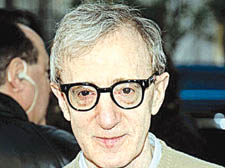|
|
 |
| |

The films of legendary director Woody Allen are obsessive but unashamed in their analysis of Jewishness. |
Long over ‘dew’ look at this fear and self-loathing
Mike Marqusee successfuly unravels the link between Jewish self-hate and Zionism, writes John Gulliver
If I Am Not For Myself – Journey of an Anti-Zionist Jew.
By Mike Marqusee.
Verso £16.99. order this book
THERE’S an old Woody Allen joke in one of his films where a friend mentions the word “dew”. “There you go again,” explodes Woody, “you can’t help saying it, ‘Jew! Jew! Jew!’”
Woody cannot be regarded as a self-hating Jew because he’s forever talking about his Jewishness without sense of embarrassment or shame.
But self-hatred can be found among blacks, Asian and Jews, fearful about their place in society, worried about the shadow cast by newly arrived immigrants who are too loud, too showy, into crime or creepily fundamentalist. It doesn’t matter whether these fears are based on reality, the fact that they are in the imagination of minorities makes them real enough.
In his pacey book If I Am Not for Myself – Journey of an anti-Zionist Jew Mike Marqusee sets out to break the link between being a self-hating Jew, which he clearly isn’t, and a Jew who hates Zionism, which he definitely is.
To make his point he dips into humour – typically Jewish, you might think – and quotes Larry David who, when accused of being a self-hating Jew because he’s whistling a tune from Wagner – replies: “I do hate myself – but not because I am Jewish.”
Marqusee’s arguments are beautifully arranged and pulsate with the philosophy of the great rabbis who have dominated Jewish thought down the ages.
Inevitably, he quotes rabbi Hillel: “If I am not for myself, who will be for me? If am for myself alone, what am I? If not now, when?”
This almost existential catechism has now passed into our literary heritage. The words “If not now, when?” is the title Primo Levi chose for one of his books on the Holocaust.
I thought I knew a bit about the Prophets but, foolishly, had never regarded them as poets, as Marqusee postulates, or realised how profound their view of the world was.
This could be summed up by the saying: Don’t judge a man until you have stood in his place.
If you had to sum up the essence of the three great religions, Judaism, Christianity and Islam, this would do.
Marqusee is stricken by a sense of shame about Israel’s bloody subjugation of its Arab neighbours – shared, I suspect, by a great many Jews in the diaspora both here in and in the States.
Most of the book is taken up by a memoir of Marqusee’s grandfather whose life-story he found in a battered leather suitcase containing letters and documents.
His grandfather, Ed Morand, was the kind of Jew I can best describe as being “A mad Jew!” Not in the pathological sense, of course, but as someone who is forever putting his intellect through its paces – in the pursuit of justice, perverse and nit-picking in argument, in the tradition of rabbis whose interpretations of the Talmud form much of the basis of Jewish thought.
Ed Morand – one of the founders of the American Party of Labour, now sadly defunct – wrote a column for a Jewish paper in New York, which had a Jewish population of 800,000 at the time, called “On the tip of my tongue”, and compered a popular radio show. He wrote and spoke up for the rights of both Jews and blacks – his only blemish, in his grandson’s eyes, was that he turned to Israel’s defence when the new state was being set up.
If you take away the ethnicity and Jewishness congruent, in some people’s eyes, with the creation of Israel, and accept as Marqusee does that Israel is part of the imperial carve-up of the Middle East, you too may come out of the end of the tunnel as an opponent of Zionism.
|
 |
|
 |
 |
|
 |
|



